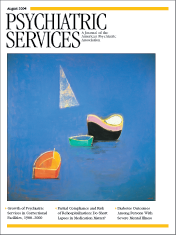Patient Perspective on Collaborative Treatment
To the Editor: Little is known about patients' understanding of collaborative treatment and the role of professionals involved. We conducted a study among 50 patients at an inner-city academic clinic who were receiving ongoing collaborative treatment from a psychiatrist and a psychologist. The patients were given a 20-item questionnaire about their opinions of their treatment providers.
All patients believed that psychiatrists can legally prescribe medication; only 6 percent thought therapists could prescribe. Eighty percent understood that all psychiatrists are physicians. Only 16 percent thought psychiatrists and therapists had the same training. Interestingly, 16 percent thought it was illegal for the same psychiatrist to conduct therapy and prescribe medication. Sixty-two percent said the psychiatrist has overall responsibility for treatment; 26 percent, the therapist; and 6 percent, both. Seventy-eight percent said the psychiatrist is legally responsible for treatment; 14 percent, the therapist; and 6 percent, both. Sixty-eight percent thought therapy should be conducted by a therapist; 10 percent, a psychiatrist; 16 percent, both; and 2 percent, neither. However, 68 percent said the psychiatrist is the most qualified to treat them by virtue of training; 18 percent, the therapist; and 12 percent, both.
Ten percent of patients understood that in times of crisis they should call a psychiatrist; 22 percent, a therapist; and 68 percent, either. Yet 26 percent said they would prefer to call a psychiatrist; 32 percent, a therapist; and 40 percent, either. Ten percent said they would call their psychiatrist in case of a problem in their life; 50 percent, their therapist; and 38 percent, either. However, 88 percent said that if the problem were related to medication they would call their psychiatrist; none said they would call their therapist, and 10 percent said they would call either. More patients were likely to disclose a problem to a therapist (58 percent) than to a psychiatrist (34 percent), to both (2 percent), or to either (4 percent). Twenty-four percent said they would conceal their problem from their therapist; 40 percent, their psychiatrist; 14 percent, neither; 2 percent, both; and 2 percent, either. When asked about getting conflicting messages from their psychiatrist and therapist, 72 percent stated that this never happens; 12 percent, that it happens occasionally; 8 percent, sometimes; and 2 percent, most of the time. Ninety-two percent thought it was more appropriate to talk to their psychiatrist if they stopped taking medication because of side effects; 2 percent, their therapist; and 4 percent, both. Eighty percent said they would talk to their psychiatrist when stopping medication because of feeling "dependent" on the medication; 12 percent, their therapist; and 2 percent, both.
Most patients (82 percent) thought getting treatment from two individuals was more helpful; 6 percent, less helpful; and 8 percent, no difference. Thirty-two percent thought getting treatment from two individuals was more cost-effective; 10 percent, less cost-effective; and 52 percent, the same.
This study had several limitations, including the small sample, the inner-city academic clinic setting, use of a simple questionnaire, and the absence of a control group.
In conclusion, it seems that patients receiving collaborative treatment have a good understanding of the roles of the treating parties and a positive appreciation of this treatment model. However, patients seem to be more likely to communicate their everyday problems and crises to their therapist than to their psychiatrist. A well-documented discussion of the treating parties' roles and goals of collaborative treatment should be part of the opening treatment sessions.
The authors are affiliated with the department of psychiatry and behavioral neurosciences at Wayne State University in Detroit, Michigan.



